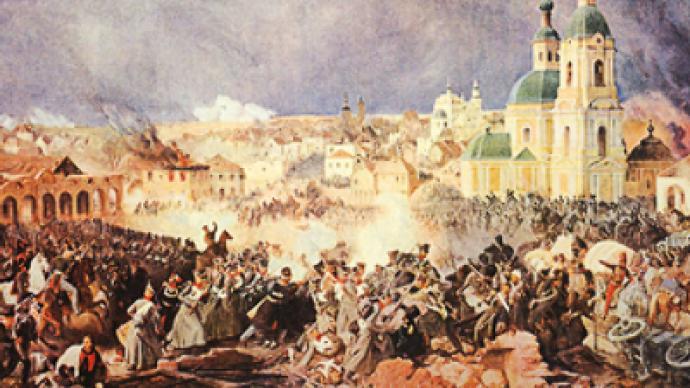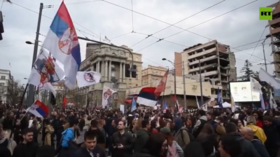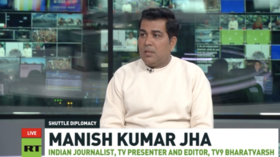Triumph over Napoleon can become Russian national holiday

A Russian Orthodox Church representative has proposed declaring January 7 the “Day of Napoleon’s Expulsion” from the country in 1812 and a national holiday.
“Christmas Day is yet another victory day for our state: on this day [January 7, 1813, according to Gregorian calendar] Tsar Alexander I issued a decree announcing the expulsion of Napoleon’s army from the Russian Empire,” Father Hieromonk Filipp, deputy head of the External Affairs Department of the Russian Church, is quoted as saying by RIA Novosti.
Speaking at a media conference this week, he recalled that before the Revolution, Russia used to celebrate both holidays on the same day: Christmas and Russia's 1812 victory over Napoleon's invasion.
“I hope this tradition will be revived,” Filipp said.
On Thursday, in a phone interview with RT, Filipp said that the proposal is not an official position of the Russian Orthodox Church.
“It is my opinion, an idea to be discussed publicly,” he said. “Each holiday should be accepted by public.”
That is why before declaring the expulsion of the French a holiday. It is important to find out how people feel about it. So, he suggested, now we should get feedback from the public. The priest added that he believed that Patriarch Kirill would also consider the proposal.
“It is not about a state holiday,” Filipp said. “The main point is to remember” the war and Russia’s and its people’s victory in it. “Russia was on the verge of extinction” when the French invaded the territory, he said, recalling the vast casualties and that Moscow was burnt to the ground.
Also, we should not forget about the “peoples’ unity,” he said. The whole Russian nation united to fight the French invasion.
A “fight against totalitarian rule”
The idea of reviving the celebration of Napoleon’s Grande Armee being thrown out of Russia has already drawn public attention.
Representatives of other religions, Kommersant daily reported, have supported the proposal. The Mufti Council’s Gulnur Gazeyeva said the proposal was “interesting.” Russian Muslims “shared all the all joys and hardships” with the rest of the nation during war in 1812. She recalled that, as a reward for their efforts, Tsar Alexander I allowed them to open the first mosque in Moscow.
In general Jews are also in favor of the idea, but say that some nuances should be taken into consideration. The Chairman of the Board at the Federation of Jewish Communities of Russia, Alexander Boroda, said that it is important to understand what emphasis the holiday will have.
“If the point is to raise patriotism, it is good,” he said. “If it is anti-Western, it is bad.”
Notably, in 1915, it was exactly the diplomacy issue that made Russia ban the celebration of the holiday. Foes turned friends then as France allied with Russia in World War I. So, the question is how the reviving of the celebration would reflect on relations between Russia and France today.
“It is important to put accents correctly,” Filipp told RT. “Russia liberated Europe from a dictator…who bent all of Europe to his will. Russia showed itself as a civilized state” in a “fight against totalitarian rule.”
This idea should not be taken as anti-Western, he said.
“The victory [over Napoleon’s invasion] made Russia a member of the family of the greatest world powers,” the priest said.
Andrey Zolotov, Editor in Chief of Russia Profile magazine, told RT that it is not likely that the celebration of Napoleon’s expulsion could somehow affect relations between Russia and France. He recalled that in the Cathedral of the House of Invalids (Les Invalides) in Paris, where Napoleon was laid to rest, Moscow and Borodino are mentioned in the list of his victories.
“Also, there is the Sebastopol metro station and Boulevard de Sebastopol in Paris, named in honor of the victory of the French – as they put it – in Sevastopol [a port city on the Black Sea] during the Crimean war,” he went on. And, he said, none of that really complicates bilateral relations between the two states. “So why would [the celebration of Russia’s victory] complicate relations?”
Why January 7?
Some analysts say that in general they support the idea of marking the date, but disapprove of declaring it a national holiday.
“I am not sure we should celebrate in some special way the day of Napoleons’ expulsion from Russia, since Russian history has many important dates proving the greatness of our state, the glory of our people, our state’s grandeur in fighting for independence,” Andrey Sakharov, Director of Institute of Russian Science, told Interfax news agency.
The historian said that January 7 was not marked in the Russian Empire and Emperor Alexander I preferred not to be reminded of the 1812 war.
“When Alexander I was asked why he rarely referred to 1812 war events, he answered: ‘It is a story of my life; it is a fire in Moscow, heavy losses. It is a drama in the history of the country,’” Sakharov said.
According to Filipp, however, January 7 should be celebrated as a holiday for many reasons. Not only was it a significant event in both Russian and European history, the 1812 war left its legacy on Russian art, architecture and literature, he told RT. The priest listed as examples “War and Peace” by Tolstoy, the Triumph Arch in Moscow, and, of course, Christ the Savior Cathedral, the largest Orthodox church ever built.
Emperor Alexander I signed a manifesto ordering the construction of Christ the Savior Cathedral in Moscow as an expression of thanks to God and to honor the victorious Russian army.
“There was also a special service, written by Philaret Drozdov,” Zolotov told RT. “It was a special prayer service for this day.”
The journalist, an expert on Orthodox Church traditions, suggested his own view on how the proposal can be interpreted.
“I think the Russian Church is looking for ways to increase the significance of the Nativity of Christ, which… has been deprived of its primacy as the main winter holiday by the Soviet cult of New Year,” Zolotov said. “But we will see where it goes. It is very difficult to declare a tradition: some traditions take root, others don’t.”
“First, of all, let’s not make of it what it is not,” he added. Echoing Filipp’s disclaimer, he said that the proposal “is not yet an official position of the Church. A proposal from Patriarch Kirill or from the Synod would be an official proposal…. Second, [the celebration] has never been repealed. It was the edict of Emperor Alexander I, which was published on the day of the Nativity of Christ.”
Napoleon’s fatal mistake
Before moving his army eastwards with an ambitious plan to conquer Russia, Napoleon had already got control of almost all continental Europe. As for official causes, Russia and France had some conflicting interests, including the French emperor’s major demand that the Tsar should tighten the continental blockade against England.
Russia, however, did not join the blockade and in addition imposed tariffs on French goods. Alexander I insisted that France withdrew troops from Prussia, claiming that Napoleon was violating the Peace of Tilsit agreement signed earlier by the two rulers.
The French invasion of Russia began on June 24, 1812, when Napoleon crossed the frontier of the Russian Empire with about 650,000 troops. The campaign, which at first promised to be a success, turned out to be the beginning of the end for the ambitious French conqueror and his Grande Armee.
Despite sustaining serious casualties and desertions, the French made Russian troops retreat. Napoleon emerged victorious from the battles at Smolensk on August 17 and Borodino on September 7. The French army, exhausted following the months-long campaign, entered Moscow on September 14 with just 110,000 troops left. Napoleon found the Russian city burning and destroyed by fleeing inhabitants.
The Russian army, led by Commander-in-Chief Mikhail Kutuzov, repulsed Napoleon's further advances and Alexander I refused to negotiate a truce. By then Napoleon had a clear understanding that waiting further for Russians to give up would not lead to anything. Besides, winter was approaching and his troops were suffering from cold, a lack of food, disease and exhaustion. So nothing remained but to withdraw.
Kutuzov’s troops pursued the retreating French army, which was also suffering from persistent Cossack attacks. Napoleon Bonaparte planned to cross the Beresina River and head for Poland. The Russian plan was to trap Grande Armee there and finally destroy it – and that is the plan that succeeded. Following the disastrous battle on Beresina on November 26-28, 1812, Napoleon left the remaining troops – ragged and weary – and returned to France. Ever since, the word “bérézina” in French has been a synonym for “catastrophe.”
On December 25, 1812 in the Julian calendar (January 7, 1813 according to Gregorian calendar), Alexander I announced the final expulsion of the invaders from the territory of the Russian Empire and the victorious end of the war.
Less than a year after that, October 16–19, 1813, the Napoleon Bonaparte’s Grande Armee was completely destroyed by Coalition forces at the Battle of Leipzig.
In 2013, it will be the 200th anniversary of the battle, also known as the Battle of the Nations. The head of the Russian Orthodox Church, Patriarch Kirill, suggested that the important event should be celebrated “with the Church, state and public taking active part.” He recalled that celebrations of the 100th anniversary of the battle were marked with the opening of an Orthodox church in Leipzig.













